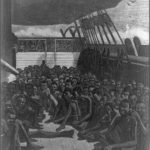This Is My Story, This Is My Song: Voices of Protest and Black Liberation
by
Janelle Poe
- My Record Collection
- “Image Title” and Source
Music has always been a major part of my life and culture. As a child, I remember our house was full of music on the weekends. From the time I was a toddler in late 70’s New York, through our years in southern California, to the late 80s in England. By the time we moved to New Jersey, in 1989, my younger brother and I had both developed a deep love for music as a way of communication, relaxation, and excitement, but especially as a way of connecting to our culture, our Black American heritage and African roots. While our parents were born and raised in the projects and disadvantaged neighborhoods in Fort Greene, Brooklyn and the South Bronx, they were the first generation in their families to graduate high school, attend college, and earn master’s degrees, some of the few to benefit from affirmative action in concrete ways that lasted beyond the mid-80s.
All this upward mobility took us further and further away from Black communities. While on one hand we benefitted from economic stability and access to great educations, we also were forced to integrate hostile environments that had been segregated for many, many years. The only African American students in our grade, and sometimes the entire school, discovering, celebrating, and maintaining a positive Black identity wasn’t easy. We experienced physical, emotional, and psychological violence throughout our time in California, England, and New Jersey. There is a distinct difference when you are called the “N-word” by someone who hates you and means every word of it. Whether they use the hard “-er” or “-a”, the slur is all the same.
Here is where I would connect to the textbook reading and the critical essay. I would include some quotations from each as evidence. I would also select a song to discuss and cite. Perhaps one from Nina Simone, since not only is she one of my favorite singers, but her live album is displayed above. I would link this album Nina Simone, Live in Paris to my recent experience there were I dealt with racism. I might end with what might be one of her most powerful protest songs, “To Be Young, Gifted, and Black”.
Works Cited (in alphabetical order)
Textbook
Critical Essay
Selected Research
Additional Sources




